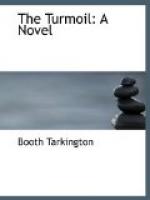The manuscript ended there, and Sheridan was not anxious for more. He crumpled the sheets into a ball, depositing it (with vigor) in a waste-basket beside him; then, rising, he consulted a Cyclopedia of Names, which a book-agent had somehow sold to him years before; a volume now first put to use for the location of “Midas.” Having read the legend, Sheridan walked up and down the spacious office, exhaling the breath of contempt. “Dam’ fool!” he mumbled. But this was no new thought, nor was the contrariness of Bibbs’s notes a surpise to him; and presently he dismissed the matter from his mind.
He felt very lonely, and this was, daily, his hardest hour. For a long time he and Jim had lunched together habitually. Roscoe preferred a club luncheon, but Jim and his father almost always went to a small restaurant near the Sheridan Building, where they spent twenty minutes in the consumption of food, and twenty in talk, with cigars. Jim came for his father every day, at five minutes after twelve, and Sheridan was again in his office at five minutes before one. But now that Jim no longer came, Sheridan remained alone in his office; he had not gone out to lunch since Jim’s death, nor did he have anything sent to him—he fasted until evening.
It was the time he missed Jim personally the most—the voice and eyes and handshake, all brisk and alert, all business-like. But these things were not the keenest in Sheridan’s grief; his sense of loss went far deeper. Roscoe was dependable, a steady old wheel-horse, and that was a great comfort; but it was in Jim that Sheridan had most happily perceived his own likeness. Jim was the one who would have been surest to keep the great property growing greater, year by year. Sheridan had fallen asleep, night after night, picturing what the growth would be under Jim. He had believed that Jim was absolutely certain to be one of the biggest men in the country. Well, it was all up to Roscoe now!
That reminded him of a question he had in mind to ask Roscoe. It was a question Sheridan considered of no present importance, but his wife had suggested it—though vaguely—and he had meant to speak to Roscoe about it. However, Roscoe had not come into his father’s office for several days, and when Sheridan had seen his son at home there had been no opportunity.
He waited until the greater part of his day’s work was over, toward four o’clock, and then went down to Roscoe’s office, which was on a lower floor. He found several men waiting for business interviews in an outer room of the series Roscoe occupied; and he supposed that he would find his son busy with others, and that his question would have to be postponed, but when he entered the door marked “R. C. Sheridan. Private,” Roscoe was there alone.
He was sitting with his back to the door, his feet on a window-sill, and he did not turn as his father opened the door.
“Some pretty good men out there waitin’ to see you, my boy,” said Sheridan. “What’s the matter?”




